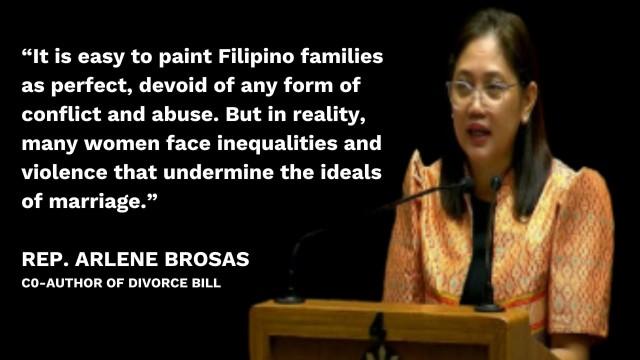Divorce in PH: 'Humanitarian imperative'?

The House of Representatives approved House Bill 9349, or the Absolute Divorce Bill, on third and final reading on May 22, sparking debates on whether the Philippines should remain as one of only two countries in the world without a divorce law.
The current Family Code in the Philippines only provides that married couples can only separate by three modes: legal separation, annulment of marriage, and declaration of nullity of marriage.
Under the proposed Absolute Divorce bill, the grounds for divorce will include all the grounds for legal separation, annulment of marriage and nullity of marriage with major additions, on top of allowing remarriage.
Grounds for Divorce under House Bill 9349
- Domestic or marital abuse as provided under the Anti-Violence Against Women and Their Children Act of 2004, without prejudice to the prosecution of the offending or errant spouse.
- Physical violence or grossly abusive conduct directed against the petitioner, a common child, or a child of the [divorce] petitioner.
- Physical violence or moral pressure to compel the petitioner to change religious or political affiliation.
- Attempt of respondent to corrupt or induce the petitioner, a common child, or a child of the petitioner, to engage in prostitution, or connivance in such corruption or inducement.
- Final judgment sentencing the respondent to imprisonment of more than six years, even if pardoned.
- Drug addiction or habitual alcoholism or chronic gambling of the respondent/
- Homosexuality of the respondent.
- Contracting by the respondent of a subsequent bigamous marriage, whether in the Philippines or abroad.
- Marital infidelity or perversion or having a child with another person other than one’s spouse during the marriage, except when upon the mutual agreement of the spouses, a child is born to them through in vitro fertilization or a similar procedure or when the wife bears a child after being a victim of rape.
- Attempt by the respondent against the life of the petitioner, a common child or a child of the petitioner; or abandonment of petitioner by respondent without justifiable cause for more than one year.
- When the spouses are legally separated by judicial decree for more than two years, either spouse can petition the proper Family Court for an absolute divorce based on said judicial decree of legal separation.
- The party in whose behalf it is sought to have the marriage annulled was 18 years of age or over but below 21, and the marriage was solemnized without the consent of the parents, guardian or person.
- Having substitute parental authority over the party, in that order, unless after attaining the age of 21, such party freely cohabited with the other and both lived together as husband and wife.

- Either party was of unsound mind, unless such party after coming to reason, freely cohabited with the other as husband and wife'
- The consent of either party was obtained by fraud, unless such party afterwards, with full knowledge of the facts constituting the fraud, freely cohabited with the other as husband and wife'
- The consent of either party was obtained by force, intimidation or undue influence, unless the same having disappeared or ceased, such party thereafter freely cohabited with the other as husband and wife.
- Either party was physically incapable of consummating the marriage with the other, and such incapacity continues or appears to be incurable.
- Either party was afflicted with a sexually transmissible infection found to be serious or appears to be incurable.
- When the spouses have been separated in fact for at least five years at the time the petition for absolute divorce is filed, and reconciliation is highly improbable.
- Psychological incapacity of either spouse as provided for in Article 36 of the Family Code of the Philippines, whether or not the incapacity existed at the time of the marriage or supervenes after the marriage.
- When one of the spouses undergoes a sex reassignment surgery or transitions from one sex to another.
- Irreconcilable differences and other forms of domestic or marital abuse.
How is it different?
Under the existing Family Code, domestic or marital abuse or violation of Republic Act No. 9262 or the Anti-Violence Against Women and Their Children Act of 2004 is explicitly stated as a ground for legal separation, but not in the annulment of marriage.
Likewise, the Family Code states that fraud as a ground for annulment of marriage only includes concealment by the wife of the fact that at the time of the marriage, she was pregnant by a man other than her husband.
The Family Code does not say anything about whether the concealment on the part of the husband of the fact that he impregnated a woman other than his wife at the time of the marriage should be considered a ground for annulment, legal separation or declaration of nullity of marriage.
In contrast, the divorce bill explicitly states that marital infidelity or perversion or having a child with another person other than one’s spouse during the marriage is a ground for divorce.
A petition for absolute divorce under House Bill 9349 must be filed with the proper Family Court by the petitioner or joint petitioners within 10 years from the occurrence or discovery of the cause for divorce or from the effectiveness of the Absolute Divorce Act, whichever comes later.
'Humanitarian Imperative'
House Assistant Minority Leader and Gabriela party-list Representative Arlene Brosas, one of the authors of the measure, described the passing of the bill as a "legislative milestone."
“It is easy to paint Filipino families as perfect, devoid of any form of conflict and abuse. But in reality, many women face inequalities and violence that undermine the ideals of marriage. [And] many Filipinos, particularly women and children, are suffering due to the lack of affordable and accessible legal mechanisms to dissolve dysfunctional and harmful marriages," Brosas said,
"The passage of the divorce bill is not just a legislative milestone, but a humanitarian imperative," added Brosas.
Albay Representative Edcel Lagman could not agree more.
“Millions of Filipino women have been waiting for the enactment of this bill, considering that wives are the victims of toxic and destroyed marriages due to the cruelty, violence, or abandonment by their husbands,” Lagman said.
“It is important to underscore that the Philippines is the only remaining country which has not legalized divorce, except the Vatican, an ecclesiastical State with only about 800 residents, mostly nuns and priests,” Lagman added.
Lagman, the lead author of the divorce bill who defended the bill’s passage before the House plenary, has also been stressing that his proposed legislation is unlike the divorce laws in other countries, which he said provided for a quickie and "no-fault" divorce.
“What is unique about this bill is that it does not recognize quickie divorce, notarial divorce, the Las Vegas type of divorce which is no fault divorce [when you don’t need to cite a reason for divorce],” Lagman said.
The bill requires the Family Court to exercise all efforts to reunite and reconcile the concerned spouses during the "60-day cooling-off period" after the filing of the petition, except for grounds under summary judicial proceedings.
If the parties have yet to reconcile upon expiration of the cooling-off period, the court will immediately proceed to trial and is mandated to decide the petition within one year after the lapse of the cooling-off period.

Emotional, Financial cost
Still, these provisions do not change the fact that severing a marriage has emotional and financial costs. The authors of the bill recognized this and provided for a clause stating that it would reduce, if not wipe out, the financial cost.
House Bill 9349 reads that a petitioner-spouse who has personal and real properties collectively not exceeding P2.5 million can apply as a court-assisted petitioner.
In the event that the application for classification as a court-assisted petitioner is approved, the Family Court will waive the payment of filing fees and other costs of litigation and will appoint a counsel de oficio for the court-assisted petitioner and assign such a number of social workers, psychologists, and psychiatrists, as may be necessary, from a pool of accredited social workers and practitioners recognized by the Department of Social Welfare and Development to assist the said petitioner and the court free of charge and assist the children of the parties.
But ultimately, shouldn’t parents instead stay together for the children?
The divorce bill maintains that having a divorce does not mean that the estranged couples seeking to end their marriage love their children any less because the divorce decree includes provisions for the care, custody, and support of children, protection of their legitimate, termination and liquidation of the conjugal partnership of gains or the absolute community, and alimony for the offended spouse.
“Even as absolute divorce is reinstituted, the state has the mandate of strengthening marriage and family life by undertaking, among others, relevant pre-nuptial and post-matrimonial programs and activities adequately funded by the government,” the bill read. —VAL, GMA Integrated News




